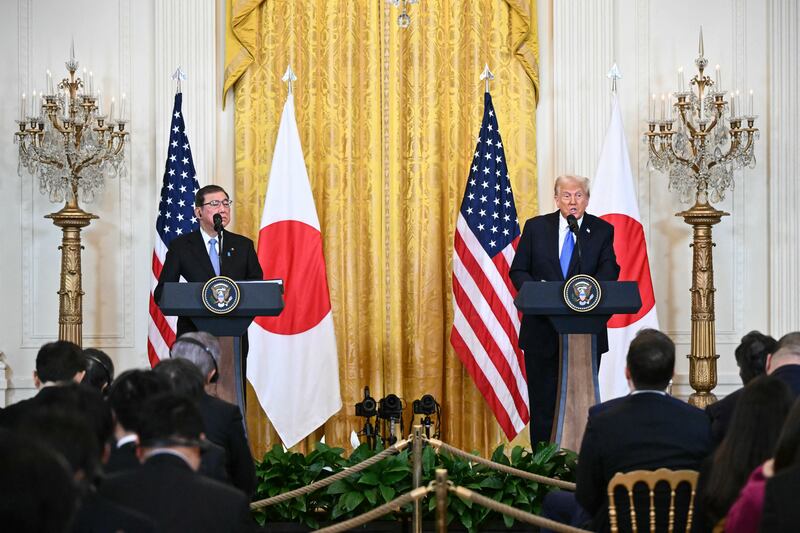TAIPEI, Taiwan – North Korea reiterated its commitment to advancing its nuclear capabilities, emphasizing that its nuclear weapons were not a “bargaining chip,” in an apparent response to a U.S.-Japan summit in which the leaders of the two allies reaffirmed their goal of the complete denuclearization of the North.
U.S. President Donald Trump and Japanese Prime Minister Shigeru Ishiba met in Washington on Friday and reaffirmed their resolute commitment to a North Korea without nuclear weapons, while underscoring the importance of trilateral cooperation with South Korea.
During a speech on Saturday, North Korean leader Kim Jong Un referred to new plans for bolstering “all deterrences” and reaffirmed the “unshakable policy of more highly developing the nuclear forces,” the North’s state-run Korean Central News Agency, or KCNA, reported.
Kim added North Korea “does not want unnecessary tension” in the region, saying, however, that it would take “sustained countermeasures to ensure the regional military balance” to prevent the outbreak of war and ensure peace and security on the peninsula, KCNA said on Sunday, without elaborating.
North Korea’s nuclear weapons were not a bargaining chip but designed for actual use against the “origin” of any attempts by its enemies to invade, KCNA said in a separate report.
“Our nuclear force is not something that can be advertised to earn recognition from anybody and not even a bargaining chip that can be exchanged for a mere sum of money,” KCNA reported on Saturday.
“Our country’s nuclear force is invariably for real combat use in a bid to swiftly cut out the origin of any invasion attempt by hostile forces that infringe upon the country’s sovereign right and people’s safety, and threaten regional peace,” it added.
KCNA did not mention the U.S.-Japan summit but criticized NATO and the European Union as “ludicrous” for stating that they would not recognize North Korea as a nuclear power.
‘Complete denuclearization’
The North’s remarks came after Trump and Ishiba, in their first in-person meeting, reaffirmed their commitment to the “complete denuclearization of North Korea,” while Trump vowed to ensure stability on the Korean peninsula.
“The two leaders expressed their serious concerns over and the need to address the Democratic People’s Republic of Korea’s nuclear and missile programs and reaffirmed their resolute commitment to the complete denuclearization of the DPRK,” they said in the statement on Friday.
“Both countries underscored the need to deter and counter the DPRK’s malicious cyber activities and the DPRK’s increasing military cooperation with Russia. In addition, both countries affirmed the importance of the Japan-US-ROK trilateral partnership in responding to the DPRK and upholding regional peace and prosperity,” they added.
The Republic of Korea, or ROK, is South Korea’s official name.

Referring to his discussions with Ishiba, Trump pointed out their shared commitment in ensuring stability in the region.
“The prime minister and I will be working closely together to maintain peace and security, and I also say peace through strength and all over the Indo-Pacific,” said Trump. “And to that end, we also remain committed to the effort I began in my first term to ensure safety and stability on the Korean Peninsula.”
During a joint press conference, Trump said that getting along with Kim was “a good thing, not a bad thing.”
“We will have relations with North Korea, with Kim JongUn. I got along with him very well,” said Trump. “We had a good relationship, and I think it’s a very big asset for everybody that I do get along with him.”
Trump launched an unprecedented diplomatic effort with North Korea during his first term, meeting Kim three times.
In January, Trump was asked in an interview if he planned to “reach out” to the North Korean leader, and he answered: “I will, yeah. He liked me.”
Japanese abductees
Ishiba said he used the talks with Trump to deliver his “strong sense of urgency” regarding the issue of Japanese citizens abducted by Pyongyang decades ago.
“Now that President Trump is in power again, if we are able to move towards resolving issues with North Korea, it would be agreed,” Ishiba said in response to a question over whether he would like to see Trump resume diplomacy with Pyongyang.
“For us, that includes not only denuclearization, but also resolving the abductee issue. Not only the abductees, but also their families too are aging.”

The issue of abductions remains a significant obstacle to diplomatic normalization between North Korea and Japan.
Japan says it has confirmed the abduction of 17 citizens by North Korea in the 1970s and 1980s, to work as language teachers for North Korean spies, and 12 are still in the North.
North Korea contends that of the 12, eight have died, and four never entered North Korea, insisting there is no issue to be resolved.
RELATED STORIES
Trade dominates Trump’s talks with Japanese leader
Tariff war escalates: China counters US with 15% duties, Google investigation
North Korea responds to US ‘hostility’ in its first criticism of the Trump government
Taiwan, South China Sea
Trump and Ishiba also reaffirmed their firm opposition to any attempts by China to alter the status quo through force or coercion in the East China Sea. They also condemned China’s maritime claims, the militarization of reclaimed features, and its “threatening and provocative” actions in the South China Sea.
“The two leaders emphasized the importance of maintaining peace and stability across the Taiwan Strait as an indispensable element of security and prosperity for the international community,” they said in a joint statement.
“They encouraged the peaceful resolution of cross-Strait issues, and opposed any attempts to unilaterally change the status quo by force or coercion.”
South Korea welcomed the joint statement, vowing to maintain its diplomatic efforts for the complete denuclearization of North Korea based on close trilateral cooperation with the U.S. and Japan.,
China had not officially commented on the U.S.-Japanese statement at time of publication.
Edited by Mike Firn.
